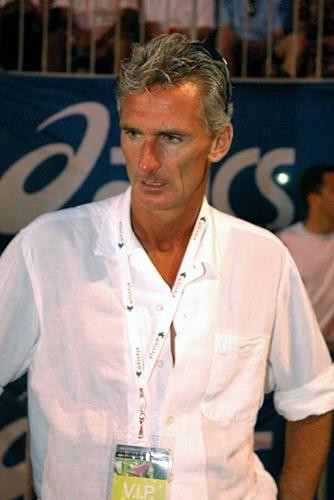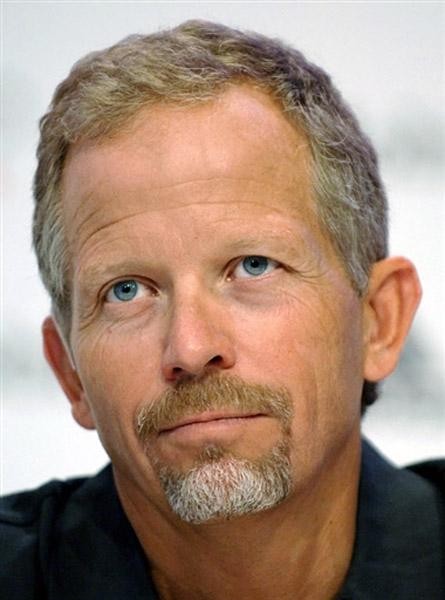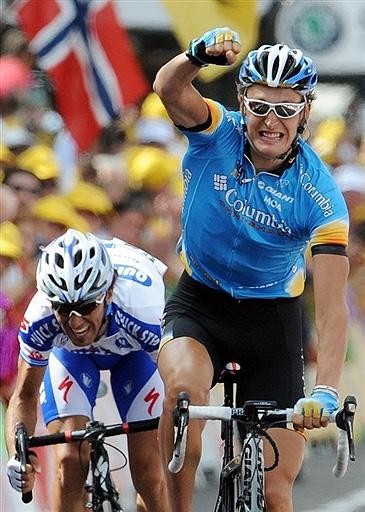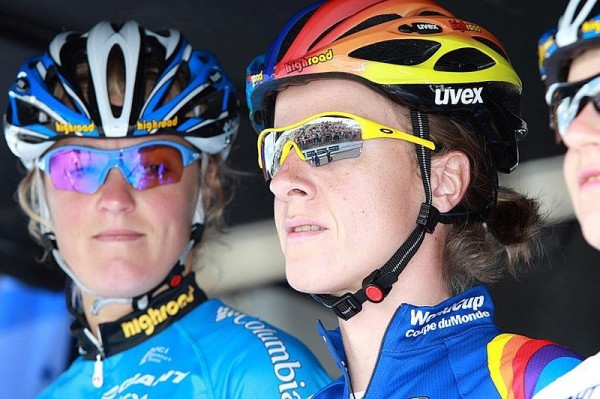United Colours of Columbia
"We're open to talent, wherever they come from; we're an international team and we have 19 different...




An interview with Bob Stapleton and Allan Peiper, January 5, 2009
Magenta was the colour associated with the team Bob Stapleton took over in 2007. As Cyclingnews' Les Clarke discovers, increasing the diversity of colours within the squad during 2008 has been the recipe for its success.
"We're open to talent, wherever they come from; we're an international team and we have 19 different countries represented in the team next year," says Team Columbia boss Bob Stapleton. "We're looking for people that are committed to the team who will sacrifice their own ambitions - we've got to be really disciplined in how we support the athletes in the team."
And the American knows about discipline. Upon inheriting the old T-Mobile squad in late 2006, Stapleton was confronted with the legacy of a team where ill-discipline prospered, spawning a culture where doping went unreported, riders underperformed and management turned a blind eye to the myriad issues at hand that needed to be addressed.
Something had to be done about the situation, and Stapleton is aware that he managed the situation the best he could - at the time. "We made bigger changes immediately [after the acquisition] than was recognised," he begins. "There are a few things we missed for sure. I was probably too trusting and taking people on their word - saying they would do what they were supposed to do. I think we've moved far beyond that.
"I never really considered it a benchmark, but we moved as far as we could as fast as we could, away from the history and legacy of that team. Unfortunately a lot of it wasn't even known to me - I didn't even realise what a mess it was until, really, a month after we'd taken over. I think we would have done more and done it differently had we known better. I couldn't be happier to be away from that.
"The team had a staggering amount of baggage and bullsh*t surrounding it. And in a highly political environment."
The latest race content, interviews, features, reviews and expert buying guides, direct to your inbox!
Following admissions from former riders, scandal surrounding current [now former] team members and the exit of T-Mobile as a headline sponsor, the past was rejected for an injection of the new. And although it has taken 18 months of questioning, searching and hard work, 2008 was when Stapleton's "United Colours of Columbia" came to fruition. Names such as Greipel, Cavendish, Pinotti and Kirchen provide an indication as to the mix of nationalities in Team Columbia - and each of these riders was successful during the season.
Technical director Allan Peiper had competed against the old T-Mobile squad as a directeur sportif for Davitamon-Lotto before his move to the German outfit at a similar time to that of Stapleton. The two have helped make the transition from "Super Squad" to a respected and successful leader in a new wave of teams where a win-at-all-costs mentality has been replaced with a more holistic approach aimed at ensuring the sport remains healthy in the long run.
Peiper is one of the pioneers of Anglophones in professional cycling in Europe, the likes of which include Phil Anderson, Sean Kelly, Stephen Roche and Andy Hampsten. And most fans would put him in that league due to his work ethic and willingness to immerse himself in the European culture. Despite his reputation as a hard man, he's embraced the supportive, nurturing environment that Columbia has used as a major factor in its success this year.
Peiper explains why this is the case. "In our team we have a good mix of people who are complementary. We get guys going through the races who are good organisers, and other guys who are very good tacticians; that works in really well together. The fact that we have 16 nationalities of riders, with five directeurs sportive from five different countries and then the manager from another country makes a hell of a difference.
"You've got prongs in different countries with different mentalities and approaches to everything. The good thing I've seen in this team in the last two years is that no one is trying to get ahead of the other one. No one person is trying to be the best in the team; we all allow each other time in the limelight and stand by what the other one says. That provides stability in management and it also filters down through the pyramid of cycling until you get to the rider level."
It should be noted that the Australian's comments reflect a complete departure from the prevalent culture at T-Mobile in a bygone era, where hierarchy and massive egos resulted in the mess that Stapleton found himself in charge of. Take the 2005 Tour de France, for example. Ullrich, Vinokourov, Klöden, Honchar… and what came of it? A time trial win for Honchar, a podium place for Ullrich and fifth overall for Vinokourov; all of these results have come under scrutiny in the years since, and most don't believe in the credibility of any of them.
The team's tactics were heavily criticised at the time, and fans still shake their heads when the topic is raised in discussion. Peiper continues, illustrating how this is never the case in the 'Columbia Experience' circa 2008. "I've been amazed the last two years because I've never had to go to the back of the peloton in the car and say, 'Guys, move up, you're too far back'. If anything, I have to get on the radio and tell the guys not to start riding too early. That's a luxurious position to be in."
The difference is that in Columbia V.08, the riders listen to their directeur because there's an inherent respect and willingness to pull for the team. Peiper puts this down to the fact that, "We've got so many nationalities, and there are no factions within the team. We've got two or three Germans, two or three Australians, two or three American riders, and the rest are from different countries. It's a big mix-and-match where factions aren't formed and there aren't little camps within the team."
Stapleton explains that just as the flawed attitude of days past was easily adopted within a team, this new type of culture has permeated throughout Team Columbia to the benefit of all the riders. "That was the nicest thing at the end of the season; we had guys like [Marco] Pinotti winning in Ireland, and Michael Barry winning a stage in Missouri. Or Eisel finishing off the season with our last win.
"All of these guys have been really good teammates all of the season and they had chances for success. Look at Marcus Burghardt in the Tour, in that breakaway where he ate Carlos Barredo alive; he had worked his butt off all Tour for Mark [Cavendish] and Kim [Kirchen]. When you see guys like that getting paid back it kind of lifts everyone."
Given this fact, Stapleton knew that securing the financial future of the team was vital to ensuring the "winning" chemistry wasn't lost. The search was on, and after financing the outfit from his own pocket as the 'High Road' enterprise during the last two months of 2007 and half of 2008, Columbia came on board mid-way throught the year. "I started talking to them in April," explains Stapleton. "It took a good couple of months. I think that was lucky - I had the Tour and we got into the right people pretty quickly."
A clean team is an attractive team to potential sponsors. And with a lot of discussion lately focusing on the implications of the Agency for Cycling Ethics (ACE) ceasing operations, Stapleton riterates why he decided on a testing program undertaken by his own volition. "For me, it's all about enforcing the code of conduct we require. I'm not out there touting that we're better or cleaner or smarter than anybody. I'm doing it because they're the rules of the team and everyone needs to follow them.
"We're minding our store very tight, and if anybody comes close to that line, they're probably going to lose their jobs... and maybe worse. For me it's all about maintaining integrity within the team; I'm really careful not to say a lot externally about who's cleaner than who because it really undermines working together in the sport.
Just as Allan Peiper speaks of different nationalities collaborating to ensure success out on the road, Stapleton is now focusing on using diversity of experience to strengthen the efforts against doping. "I came into the sport really aggressively saying that we need to shine a spotlight on the issue if we can, to know if this stuff is happening," he says.
"I think two years later people are saying, 'Wow, this is a real problem...' I've changed my approach and I'm much more focused on collaborative solutions with other teams and the governing bodies. People are mostly looking for answers - I don't think there's anybody not wanting to make progress on these issues now. I think it's just a question of how to do it, and working together is a better approach for us now."
So concentrating on the collective, capitalising on difference and focusing energies on common goals are all part of the Stapleton mantra, best summarised when he says that, "Ultimately, successful teams have to be international teams. You see that in almost everything…" And given Columbia's record of 83 wins in 2008, who are we to argue with that?
Related articles:
Another chapter begins...
Catlin fills ACE void for Columbia and Garmin
Solid sponsorship key for Stapleton
Greipel "never lost the focus"
High Road's Stapleton on Columbia future
Fresh start for Team High Road

